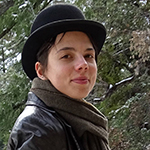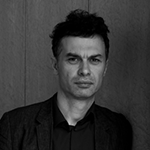US
I want to make an exhibition
with the title Female Abstraction
I’ll ask Chris Kraus
to write the catalog and give
a talk at the opening
The first room is long and narrow
and full of small paintings
A few by Marthe Donas
one by Sonia Delaunay
from back when she still went by Terk
and work by other Russian women, too
Alexandra Exter, Natalia Goncharova,
Lyubov Popova, Olga Rozanova, etc.
Behind that a large hall full of
blood-red panels by Marthe Wéry
crammed together on the floor
so that almost no one can pass between them
Those who do I will surprise
in the next room with drawings by
Nasreen Mohamedi and Agnes Martin
Follow their lines and
you end up in a little room off to the side
with sculptures by Lygia Clark
and another with watercolors by Etel Adnan
In the next room, a giant
painting by Helen Frankenthaler
Most people stop here
and go back home
where they will tell everyone
what they do not yet know
Those who keep going end up in a space
where music by Sofia Gubaidulina is playing
but where nothing can be seen
since it’s pitch-black
because of the blackout curtains
made by Lili Dujouri
Instinctively, you kick off your shoes
and walk on barefoot
On the floor, there are rugs
Turkmen and Afghan
full of bald spots from years of kneeling
If you get cold there are blankets
woven by Berber women
and frayed by Anni Albers
for better praying
Men who miss their mothers
come here for furtive embraces
and to pass each other notes
with handwritten poems by
Ariana, Athena, Ida and Monika
In the second-to-last room I will hang
the final work by Ilse D’Hollander
and on the floor, one of Mary Temple’s
painted shadows of a tree
The exhibition ends in a space
dedicated to Lilly Reich
There is no masonry, just glass
also known as “curtain walls”
looking out onto trees in autumn
sometime in late October
when there are still leaves and the sun
is out one last time
before the long dark begins again
Oaks, beeches, ash and plane trees
I ask Ann Veronica Janssens
to stop by with her hammer
and smash all the windows
In the middle of the room
there’s a bench, just big enough
for two people, you and me
We sit there for hours and talk about us
Les Barricades Mysteriéuses,
or How I Was Suddenly Old
1.
Clement Greenberg drilled holes
in the ceiling, big enough
to stick his head through
With wide nostrils—
cocaine of fresh air—
he sniffed us this day
our daily bread
His footman, equally
optimistic, assisted him
but gave up straight away
I prefer it down here,
he said with a touch of resignation
and made a well
2.
In the morning I hoped to bike past it
but it was already too late
The dug-up asphalt blocked
the lane in piles of remains
Let me through, I begged,
grant me one last look.
Songs nor candles
helped as lubricant
Please, Father Clement,
I’ll wear a bowtie if need be
Alas, his class consciousness
won out. Dejected,
I sat down on a rock,
had almost given up,
when, luminous, I got up again
and shouted ‘Kafka is a Jew’
A smile of recognition
allowed me in and I joined
the past
3.
It’s so beautiful here
I said to no one
in particular,
at least, it was dark
and smelled damp
pleasant really
this lack of people
The deeper I descended
the greater the pleasure
There was a fair amount of clemency
the odd worm
sometimes a mole
4.
Little creatures, I said
have you heard?
I’m your
new past
Everyone jumped up
and tickled me
during the petting that followed
5.
I found myself again
in a container, left
with a group of children
who were begging to be adopted
I was made to wait
in a dark room
that smelled of rotting meat
One of them wouldn’t stop screaming
Wherefore!? Therefore!?
A shortage, expressed
as a surplus, comforted me
beneath the curtainless windows
I lulled my self to sleep
until the hour assumed
the perfection of morning
6.
In the end I wrote
a letter in broken alexandrine
and recorded it as a message:
Dear Clement,
Leaden is the weight
that rarely if ever softens, abates
the fates of those of lowly state
He wanted history on Earth,
he wrote back,
something heavenly, if need be, for
security, leisure and comfort,
juggling in a lonely jungle
of immediate sensations
7.
On salt and wet asphalt
I spread my joy
a t-shirt with logos or workmen
with usernames
I cursed my cobblers
and hobbled around a hole,
threw daily bread onto the ground
and watched a cloud of crows
fall apart, unanswered
8.
I looked at repairs
but kept to the old
Translator’s Note:
Two influences are a recurring theme in Tom Van de Voorde’s work: visual art and modernism. In these poems both are represented. In “Les Barricades Mysteriéuses,” the speaker follows prominent 20th-century art critic Clement Greenberg into a hole in the road. It’s a kind of Orphean descent, into the past, into the world of the subconscious. Tom himself considers it to be a watershed poem, describing a journey that fundamentally transforms the speaker’s consciousness.
For the most part, the language in Tom’s poetry is direct and straightforward, even if what’s going on can be quite cryptic. The surreal quality derives first and foremost from the scenes and images being described. But there’s something Eliotian about the economy of language—the way a sudden, inventive adjective or neologism can cause a line to reverberate, as when the speaker watches ‘a cloud of crows / fall apart, unanswered.’
As a translator, I try to be attentive to these moments, and replicate the shifts in register that lift the poem above the immediate and referential and invoke something deeper, more lyrical, ancient: for instance, at the end of “Us,” when the speaker imagines glass walls that give the visitors to his imaginary art exhibition a view of the autumn leaves in late October, ‘before the long dark begins again.’

Emma Rault is a writer and a translator from Dutch and German. LitHub voted her translation of Rudolph Herzog’s Ghosts of Berlin one of the best books of 2019. She is a 2019 Idyllwild Arts Non-Fiction Fellow and the recipient of the 2017 GINT Translation Prize. Her work appears in the LA Review of Books, Literary Hub, Asymptote, and elsewhere. She lives in Los Angeles.

Tom Van de Voorde (b. 1974) is a writer, curator of interdisciplinary projects, and translator of poetry into Dutch. He is the author of four volumes of poetry: Jouw zwaartekracht mijn veer (‘Your Gravity My Feather’), Vliesgevels filter (‘Curtain Wall Filter’), Liefde en aarde (‘Love and Earth’), and Zwembad de verbeelding (‘Swimming Pool Imagination’). His published translations include work by Wallace Stevens, Michael Palmer, and Ariana Reines, and his own poetry has been translated into ten languages.

 BACK TO ISSUE
BACK TO ISSUE